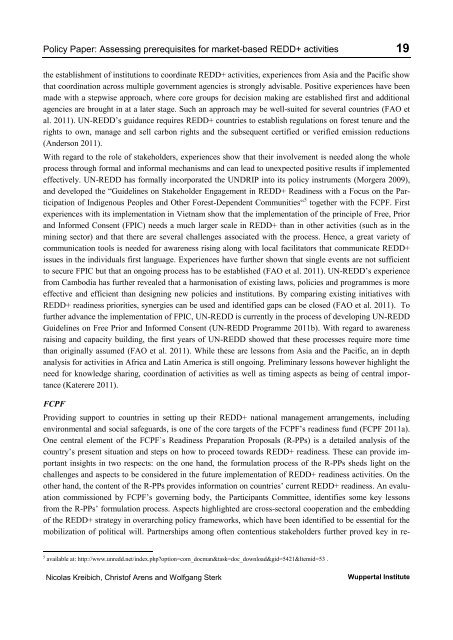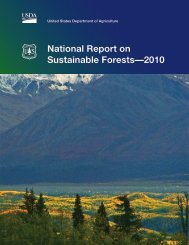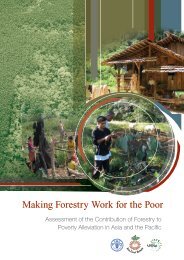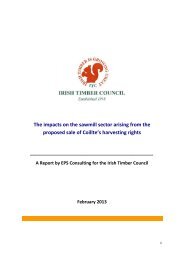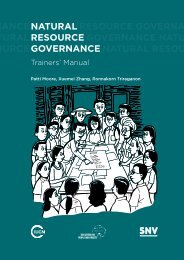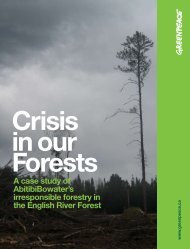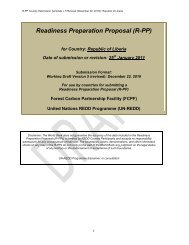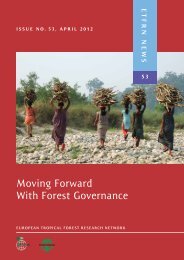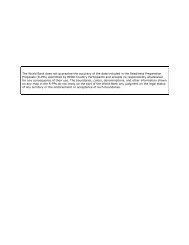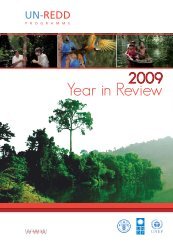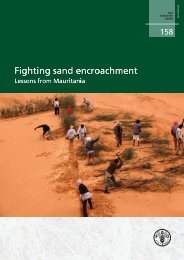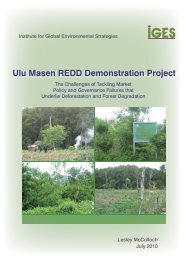pdf 1242 KByte - JIKO
pdf 1242 KByte - JIKO
pdf 1242 KByte - JIKO
Create successful ePaper yourself
Turn your PDF publications into a flip-book with our unique Google optimized e-Paper software.
Policy Paper: Assessing prerequisites for market-based REDD+ activities 19<br />
the establishment of institutions to coordinate REDD+ activities, experiences from Asia and the Pacific show<br />
that coordination across multiple government agencies is strongly advisable. Positive experiences have been<br />
made with a stepwise approach, where core groups for decision making are established first and additional<br />
agencies are brought in at a later stage. Such an approach may be well-suited for several countries (FAO et<br />
al. 2011). UN-REDD’s guidance requires REDD+ countries to establish regulations on forest tenure and the<br />
rights to own, manage and sell carbon rights and the subsequent certified or verified emission reductions<br />
(Anderson 2011).<br />
With regard to the role of stakeholders, experiences show that their involvement is needed along the whole<br />
process through formal and informal mechanisms and can lead to unexpected positive results if implemented<br />
effectively. UN-REDD has formally incorporated the UNDRIP into its policy instruments (Morgera 2009),<br />
and developed the “Guidelines on Stakeholder Engagement in REDD+ Readiness with a Focus on the Participation<br />
of Indigenous Peoples and Other Forest-Dependent Communities“ 5 together with the FCPF. First<br />
experiences with its implementation in Vietnam show that the implementation of the principle of Free, Prior<br />
and Informed Consent (FPIC) needs a much larger scale in REDD+ than in other activities (such as in the<br />
mining sector) and that there are several challenges associated with the process. Hence, a great variety of<br />
communication tools is needed for awareness rising along with local facilitators that communicate REDD+<br />
issues in the individuals first language. Experiences have further shown that single events are not sufficient<br />
to secure FPIC but that an ongoing process has to be established (FAO et al. 2011). UN-REDD’s experience<br />
from Cambodia has further revealed that a harmonisation of existing laws, policies and programmes is more<br />
effective and efficient than designing new policies and institutions. By comparing existing initiatives with<br />
REDD+ readiness priorities, synergies can be used and identified gaps can be closed (FAO et al. 2011). To<br />
further advance the implementation of FPIC, UN-REDD is currently in the process of developing UN-REDD<br />
Guidelines on Free Prior and Informed Consent (UN-REDD Programme 2011b). With regard to awareness<br />
raising and capacity building, the first years of UN-REDD showed that these processes require more time<br />
than originally assumed (FAO et al. 2011). While these are lessons from Asia and the Pacific, an in depth<br />
analysis for activities in Africa and Latin America is still ongoing. Preliminary lessons however highlight the<br />
need for knowledge sharing, coordination of activities as well as timing aspects as being of central importance<br />
(Katerere 2011).<br />
FCPF<br />
Providing support to countries in setting up their REDD+ national management arrangements, including<br />
environmental and social safeguards, is one of the core targets of the FCPF’s readiness fund (FCPF 2011a).<br />
One central element of the FCPF`s Readiness Preparation Proposals (R-PPs) is a detailed analysis of the<br />
country’s present situation and steps on how to proceed towards REDD+ readiness. These can provide important<br />
insights in two respects: on the one hand, the formulation process of the R-PPs sheds light on the<br />
challenges and aspects to be considered in the future implementation of REDD+ readiness activities. On the<br />
other hand, the content of the R-PPs provides information on countries’ current REDD+ readiness. An evaluation<br />
commissioned by FCPF’s governing body, the Participants Committee, identifies some key lessons<br />
from the R-PPs’ formulation process. Aspects highlighted are cross-sectoral cooperation and the embedding<br />
of the REDD+ strategy in overarching policy frameworks, which have been identified to be essential for the<br />
mobilization of political will. Partnerships among often contentious stakeholders further proved key in re-<br />
5 available at: http://www.unredd.net/index.php?option=com_docman&task=doc_download&gid=5421&Itemid=53 .<br />
Nicolas Kreibich, Christof Arens and Wolfgang Sterk<br />
Wuppertal Institute


